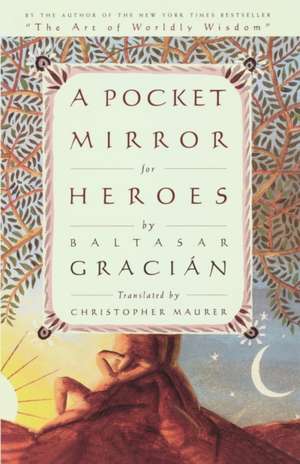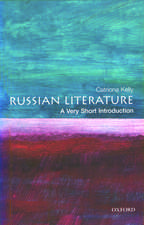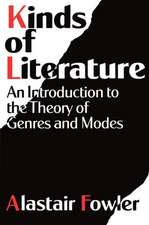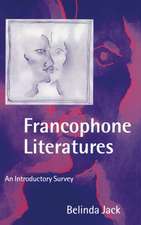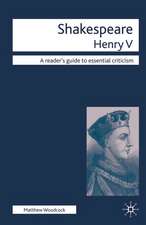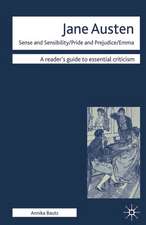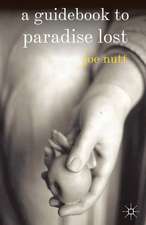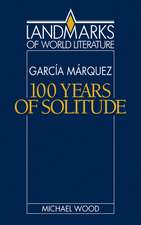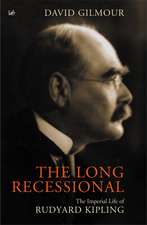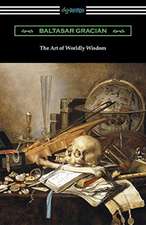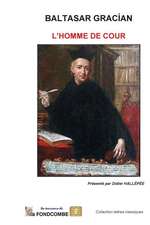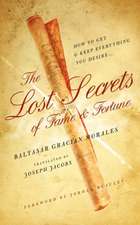The Pocket Mirror of Heroes
Autor Christopher Maurer, Baltasar Gracianen Limba Engleză Paperback – 31 dec 2000
Gracian teaches the reader to be "a giant"--"the greatest person possible, a miracle of perfection, a king." Wit, wisdom, courage, elegance, grace, humility, spontaneity--these are the qualities needed to reach heroism in any occupation. But it is not enough to be wise or graceful: one must learn as well how to manage that talent, how to distinguish a quality fiom its shadow. A Pocket Mirror for Heroes provides "a politics for governing oneself, a compass for sailing toward excellence, an art for reaching distinction with just a few rules of discretion," and it will be wise and witty company for anyone who recognizes--and relishes--the challenges of daily life.
From the Hardcover edition.
Preț: 109.73 lei
Nou
20.100€ • 22.45$ • 17.51£
Carte disponibilă
Livrare economică 27 martie-10 aprilie
Specificații
ISBN-10: 0385503148
Pagini: 224
Dimensiuni: 142 x 222 x 15 mm
Greutate: 0.3 kg
Editura: Doubleday Books
Extras
How singular I want you to be! With a book that is a dwarf I want to make a Giant. In the shortest of sayings set down immortal deeds. I will try to make you the Greatest person possible, a miracle of perfection, a king, if not by birth, by deeds.
Seneca formed a prudent person. Aesop a shrewd one. Homer a warrior. Aristotle a philosopher. Tacitus a statesman. And Castiglione a courtier.
Copying some of the choicest parts of these Great Masters I intend to sketch out a hero, a universal prodigy. That is why I made this pocket mirror from the glass of others and my own fragile nature. At times it will delight you, at others counsel and instruct. In it you will recognize the person you are or the one you ought to be.
You will find here a book neither of statecraft nor of economics but a politics for Governing yourself, a compass for sailing toward excellence, an art for reaching distinction with just a few rules of discretion.
I write in brief because your understanding is large. My words are as short as the subject is long. But let me not detain you: go forward.
BORN TO RULE
This chapter covers a gift so subtle it would vanish into thin air were it not held fast by attentive curiosity.
In some people there shines an innate sense of leadership, a secret source of dominion that sparks obedience in others without need for orders and without the art of persuasion.
When Caesar was the captive of the island pirates, he was most their master. Conquered, he commanded; conquerors, they obeyed. He was captive only in ceremony, and master in the reality of his leadership.
People like these do more with a single stern look than others with all their diligence. Their words have a secret vigor, and they achieve more by sympathy than by daylight.
The proudest minds and freest judgments bow to them without knowing why.
They are almost lions among people, sharing the lion's most important trait: dominion.
The lion is recognized by all the other animals with a kind of natural prescience without ever testing his bravery, they foresee and flatter it.
Thus it is with these heroes, kings by nature, others advance them respect without asking for the collateral of talent.
This gift deserves a crown; if you also have understanding and a great heart, you lack nothing to become a political prime mover.
This lordly gift was enthroned in the Duke of Alba, a lord more by nature than by favor. He was great, and was born to be greater, and even his speech revealed this natural sense of command.
This quality is far from false gravity, from an affected tone of voice-- the quintessence of what is abominable, though much less odious if it is natural.
It is further still from self-doubt, and the outright questioning of one's own worth, which is an open invitation to scorn.
It was a teaching of Cato, a sign of his severity, that we should respect, and even fear, ourselves.
Lose fear of yourself, grow too familiar, and you give license to others to do the same.
MORAL ANATOMY
The divine philosopher was right to compare the human body to a resonant, living instrument. When it is well tuned, it makes marvelous music; and when it is not, it is all confusion and dissonance. It is composed of many, many very different strings, incredibly hard to adjust to one another, and its pegs are always slipping. Some have called the tongue hardest to tune, and some the covetous hand. One person says the eyes, which never see enough vanity, another the ears, which cannot get ther fill of flattery and gossip. Some say it is the fancy, some the insatiable appetite some the deep heart or the bitter gut. But taking leave of them, I would say it is the belly, as so it is in all ages: in childhood because it is always hungry, in youth because of desire, in middle age because of its voracity, and in old age because of its craving for wine.
EARLIDS
We have eyelids but not earlids, for the ears are the portals of learning, and Nature wanted to keep them wide open. Not content with denying us this door, she also keeps us, alone among all listeners, from twitching our ears. Man alone holds them motionless, always on alert. She did not want us to lose a single second in cocking our ears and sharpening our hearing. The ears hold court at all hours, even when the soul retures to its chambers. In fact, it is then that those sentinels ought to be most wide awaks. If not, who would warn of danger? When the mind goes lazily off to sleep, who else would rouse it? This is the difference between seeing and hearing. For the eyes seek out things deliberately, when and if they want, but things come spontaneously to the ears. Visible things tend to remain: if we don't look at them now, we can do so later, but most sounds pass by quickly, and we must grab that opportunity by the forelock. Our one tongue is twice enclosed, our two ears are twice open, so that we can hear twice as much as we speak. I realize that half, perhaps more, of all things heard are unpleasant and even harmful, but for this there is a fine solution, which is to pretend not to hear, or to hear like a shopkeeper or a wise man. And there are things so devoid of reason that one walls up the ears with the hands. For if the hands help us to hear, they can also defend us from flattery. The snake knows a way to escape the charmer: he keeps one ear to the ground and plugs the other one with his tail.
A WISE MOUTH...
How provident Nature was when she made the mouth not only for speech but fot taste! We can examine our words before we pronounce them, and sometimes chew on them, and see if they have substance, and if we notice they will embitter others, sweeten them up a bit. We can find out how a "no" tastes, and how someone will digest it, and coat it with sugar. Let the tongue be used to eat, and for much else besides, so that we can sometimes keep silent...
AND GOOD EARS...
Nature formed our ears to be colanders of words, funnels of knowledge. She shaped her ear like a labyrinthine shell, with turns and whorls, or like the gratings and traverses of a fortress, so that words could be sifted, reasons purified, and so that there would be time to winnow truth from deceit.
From the Hardcover edition.
Descriere
A Pocket Mirror for Heroes is a mirror because it reflects "the person you are or the one you ought to be." It is a pocket mirror because its author took the time to be brief. And it is a mirror for heroes because it provides a vivid image of ethical and moral perfection to which all can aspire. The Art of Worldly Wisdom by Baltasar Gracian was all but forgotten for three hundred years, until its republication in 1992 turned this lost classic into a New York Times bestseller. Now Gracian, the Spanish Jesuit considered Machiavelli's better in strategy and insight, sets a new standard on the art of living and the practice of achieving. That new standard is the art of heroism--how to be "the consummate person, ripe and perfect: accurate in judgment, mature in taste, attentive in listening, wise in sayings, shrewd in deeds, the center of all perfection."
Gracian teaches the reader to be "a giant"--"the greatest person possible, a miracle of perfection, a king." Wit, wisdom, courage, elegance, grace, humility, spontaneity--these are the qualities needed to reach heroism in any occupation. But it is not enough to be wise or graceful: one must learn as well how to manage that talent, how to distinguish a quality fiom its shadow. A Pocket Mirror for Heroes provides "a politics for governing oneself, a compass for sailing toward excellence, an art for reaching distinction with just a few rules of discretion," and it will be wise and witty company for anyone who recognizes--and relishes--the challenges of daily life.
From the Hardcover edition.
